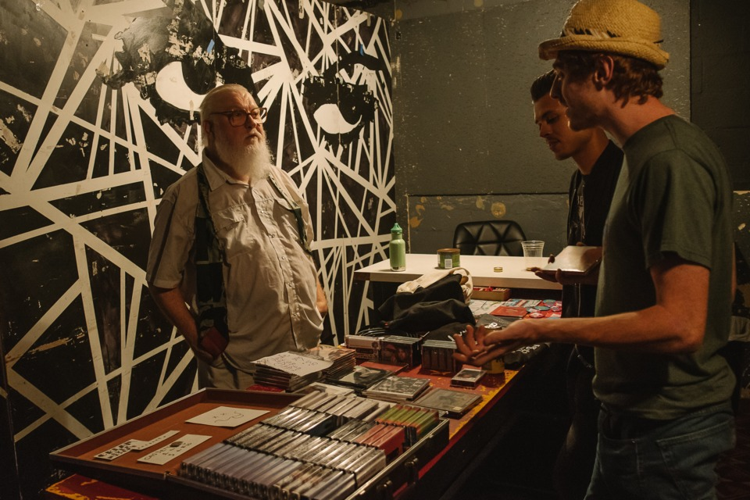
As attentive listeners have come to realize, Nashville singer, guitarist, self-producer and songwriter R. Stevie Moore represents Music City in a way that remains, unfortunately, obscure. In nearly every way, Moore’s ’70s work anticipates the future Nashville rock of Bill Lloyd, The Shazam, Swan Dive and, come to think of it, every power-pop-obsessed, guitar-jangling, Byrds-worshipping Nashville band who ever tried to rewrite the rules of guitar pop.
Yet Moore, as he says in this week’s Scene profile, remains obscure to centrist fans of power pop — unlike Badfinger, Moore has never scored a hit. He’s not a standard-issue cult hero, either. There’s no Radio City in his oeuvre, which doesn’t mean that Moore shouldn’t be given the same credence as Big Star. He's earned his power pop credentials — check out his lo-fi, but bracing, 1975 album of Beatles covers. But Moore, at 66, doesn’t do power pop anymore. The last time we caught his act, he was doing a pretty good comedy routine, which consisted of muttering twisted puns and playing guitar in a post-Captain Beefheart mode over manipulated loops. As spoken-word projects go, it was fun. With this in mind, The Spin navigated to The East Room Saturday night to see what his latest project, R. Stevia Moorea’s Amnesia Insomnia, was all about.

Iven
We settled in to watch Nashville’s Iven, led by guitarist and songwriter Isaac Q. Horton, who were playing their first show with a new lineup. After a shaky start, they hit their stride, if that’s the right idiom to use regarding a band whose guiding principle is disjunction. We’re fans of the band’s 2018 release Little Lady #1, one of the most original records released by a Nashville band so far this year. Like Moore’s famed 1976 album Phonography — still perhaps the best-known of Moore’s many albums — Little Lady #1 was done as a one-man-band project. Horton succeeds brilliantly on the record’s “Cut Off My Head,” an ’80s pop-soul extrapolation, complete with an impossibly hooky guitar lick that sounds lifted from a Hall and Oates album.
Their live show is far more kinetic and sloppy than Little Lady #1 would suggest. Horton began some tunes with simple finger-picking riffs that merged with the sprung rhythms of drummer Nick Domer and bassist Joe Romweber. The band achieved a gawky groove that put us in mind of Pavement and the early days of The Go-Betweens, and Horton played simple, well-chosen single-note solos that were unfailingly interesting. This was anti-pop we could sink our teeth into.

Us, Today
Up next was Cincinnati’s Us, Today, who impressed us with their fusion of minimalism, funk and math-rock. Vibraphonist and keyboardist Kristin Agee began one song by playing straight quarter notes on the vibraphone and a jazzy, repeating figure on electric piano. Bassist Joel Griggs and drummer Jeff Mellott kept the dizzying array of time signatures flowing, and at their best the trio reminded us of Tortoise circa Standards or King Crimson at their most polyrhythmic. Their set proved that math-rock is most effective when it comes with a healthy admixture of shlock.

R. Stevia Moorea's Amnesia Insomnia
Moore hit the stage with the air of a sage whose presence needs no introduction or explanation. Not only has he moved away from power pop, he seems to have shied away from pop almost entirely. He collaborates with younger musicians, and Saturday’s incarnation of Amnesia Insomnia featured drummer Will Hicks with Tyler Blankenship on bass and Brandon Greer on guitar — all Nashville musicians who have worked in a variety of contexts.
Moore’s performance made virtually no concessions to pop music. Playing abstract licks on his Rickenbacker guitar, Moore intoned words that had a dark edge. In one song he asked, “Can you take me home?” In another, he uttered the sinister neologism, “Americanaclast.” Moore’s guitar licks shaped themselves against a shifting beat, and a couple of pieces veered off into chaos. Listening to Moore declaim his poetry in his bass voice, we were put in mind of a circa-1975 radio broadcast that had returned to earth after spending decades in space.

R. Stevia Moorea's Amnesia Insomnia
If Moore doesn’t play pop anymore, he alludes to a vanished world of pop, in which the experimentalism of The Beatles, Frank Zappa and The Residents countered the blandness of commercial music. He may have mentioned something about having “zero pop sensibility” in one song, but he’s steeped in that sensibility even if he no longer trusts in its implications. Toward the end of his set, he said, “Leave me alone / In my lonely home / I’m dying.” It was a weird, brave performance, and miles away from any kind of reassurance.
See our slideshow for more photos.
In The Spin — the Scene's live review column — staffers and freelance contributors review concerts under a collective byline.









